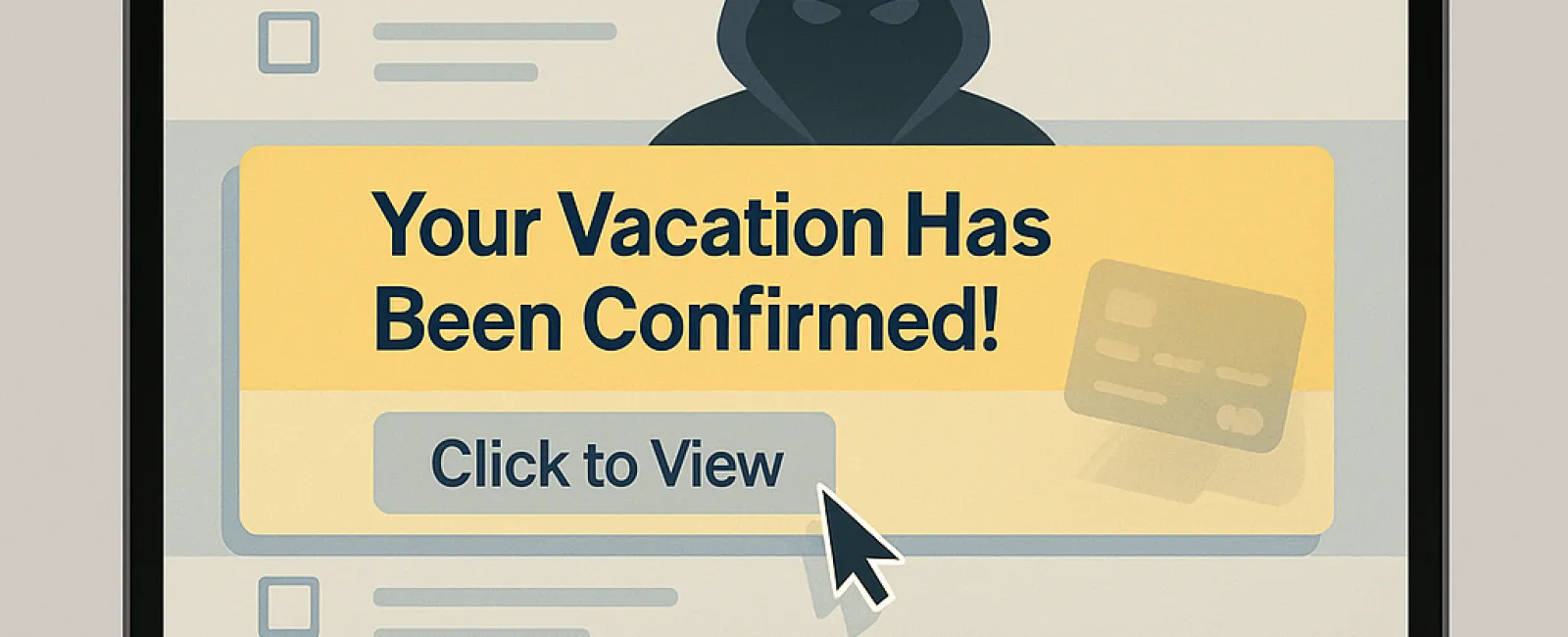May 12, 2025
Planning a vacation this year? Ensure your confirmation email is legitimate BEFORE you click anything!
Summer is approaching, and cybercriminals are taking advantage of the travel season by sending deceptive booking confirmations that closely resemble emails from airlines, hotels, and travel agencies. These scams aim to steal personal and financial information, hijack online accounts, and even infect devices with malware.
Even tech-savvy travelers are falling victim to these schemes.
Here's How The Scam Works
A Fake Booking Confirmation Arrives In Your Inbox
The email may appear to be from reputable travel companies like Expedia, Delta, or Marriott.
Hackers often use official logos, proper formatting, and even "customer support" numbers.
Subject lines create a sense of urgency:
- "Your Trip To Miami Has Been Confirmed! Click Here For Details"
- "Your Flight Itinerary Has Changed - Click Here For Updates"
- "Action Required: Confirm Your Hotel Stay"
- "Final Step: Complete Your Rental Car Reservation"
You Click The Link And Are Redirected To A Fake Website
The email prompts you to "log in" to confirm details, update payment information, or download your itinerary.
Clicking the link directs you to a convincing yet fake website that captures your credentials when you enter them.
Hackers Steal Your Information And/Or Money
If you enter your login credentials on the impersonated website, hackers gain access to your airline, hotel, or financial accounts.
If you provide payment details, they can steal your credit card information or execute fraudulent transactions.
If the link contains malware, your device and all its contents could be compromised.
Why This Scam Is So Effective
- It Looks Legit: These phishing emails closely mimic real confirmation emails, including logos, formatting, and familiar-looking links.
- It Plays On Urgency: Messages about "reservation issues" or "flight changes" can trigger panic, causing people to act quickly without verifying.
- People Are Distracted: Whether busy with work or excited about an upcoming trip, individuals are less likely to scrutinize an email's authenticity.
It's Not Just Personal - It's a Business Risk Too.
For businesses, this scam poses an even greater threat. Many organizations have one person managing all reservations, including flights, hotels, rental cars, and conference bookings.
With numerous confirmation emails received, it's easy for a fraudulent one to go unnoticed. A single click from an office manager, travel coordinator, or executive assistant could:
- Expose the company credit card to fraud.
- Compromise login credentials for corporate travel accounts.
- Introduce malware into the company network if the scam includes malicious attachments.
How To Protect Yourself And Your Business
- Verify Before You Click - Always visit the airline, hotel, or booking website directly rather than clicking links in emails.
- Check The Sender's Email Address - Scammers often use addresses that are similar but not exact (e.g., "@deltacom.com" instead of "@delta.com").
- Warn Your Team - Educate employees about recognizing phishing scams, especially those involved in company travel bookings.
- Enable Multifactor Authentication (MFA) - MFA provides an additional layer of security even if credentials are compromised.
- Lock Down Business Email Accounts - Implement security measures to block malicious links and attachments.
Don't Let A Fake Travel Email Cost You Business
Cybercriminals know the best time to strike, and travel season is a prime opportunity.
If you or anyone on your team books work-related travel, manages reservations, or oversees expense reports, you're a target.
Let's ensure your business is safeguarded.
Start with a FREE 15-Minute Discovery Call. We'll check for vulnerabilities,
strengthen your defenses and help safeguard your team against phishing scams
like this.
Click here or give us a call at 888-624-7383 to schedule your FREE
15-Minute Discovery Call today!



